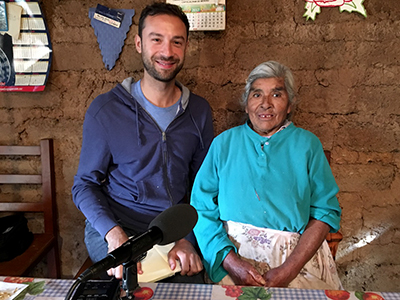Campus News
UCSC linguists receive $400,000 NSF grant for research on rarely studied languages
UC Santa Cruz linguistics professors Maziar Toosarvandani, Ivy Sichel, and Matthew Wagers have been awarded a $411,058 grant from the National Science Foundation to support research on endangered languages.




UC Santa Cruz linguistics professors Maziar Toosarvandani, Ivy Sichel, and Matthew Wagers have been awarded a $411,058 grant from the National Science Foundation to support research on endangered languages.
Titled “Animacy and Resumption at the Border of Cognition and Grammar,” the grant will help them bring together all the strands of work they have been doing with the Zapotec community in California and in Mexico—including the creation of community partnerships, fieldwork, and research opportunities for undergraduate students in Oaxaca.
“The project builds on our long-term engagement with the large community of indigenous Oaxacans now living in Santa Cruz and Monterey Counties,” said principal investigator Toosarvandani.
“In recent years, linguists at UC Santa Cruz have been learning about the endangered languages these immigrants have brought with them (Zapotec, Mixtec, and Chatino), as well as finding ways to make this knowledge useful to the community through our Nido de Lenguas initiative with the local non-profit organization Senderos.”
“The grant will support our linguists as we work with speakers of Oaxacan languages here in California and in Oaxaca, providing unique research opportunities for UCSC undergraduates,” he added. “We will be investigating a fundamental aspect of cognition: how language users refer to the world around them through their system of pronouns, and how this system is shaped by animacy—how much something is conceived of as alive or human.”
Toosarvandani noted that the grant will also support a comparison between Zapotec, a language that has not been studied much by linguists, and Modern Hebrew, a language that is much better understood.
“The two languages seem to have some unusual similarities in their pronoun systems, but they represent animacy in vastly different ways,” said Toosarvandani. “Zapotec has dedicated pronouns for elder and younger humans, animals, and things, while Hebrew has a more restricted system (though even with these limited resources, it is sensitive to animacy). By conducting parallel studies in both languages, we will develop a better understanding of how animacy is represented in language and, more generally, in human cognition.”
Bringing together two syntacticians with interests in Hebrew (Sichel) and Zapotec (Toosarvandani), and a psycholinguist (Wagers), this cross-disciplinary project addresses a discrepancy between theories of grammatical competence and recent findings in language processing and experimental linguistics.
Results from the research and background fieldwork will add to the development of language materials in the ongoing collaboration between the Linguistics Department and the Santa Cruz non-profit organization, Senderos, and will also be shared at monthly language classes, local cultural festivals, and regular workshops to introduce the public to the indigenous languages of Oaxaca.
Toosarvandani added that UCSC’s Humanities Institute (THI) has provided critical support for the linguists, providing seed funding and planning support for new programs, and coordinating funding and logistics for a research fieldwork trip in Oaxaca last year with students.
“THI’s investments at these critical stages have made all the difference, laying the foundation for this NSF grant and the project’s future success,” he noted. “It is hard to imagine how we could have done it without THI.”